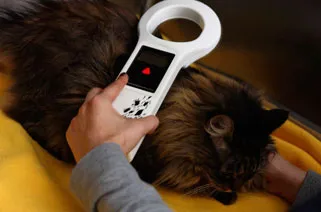The thought of a cherished pet going missing is a nightmare for any owner. Each year, countless pets vanish, and tragically, many never find their way back home. While collars and identification tags offer a layer of security, they are not foolproof; collars can break, and tags can become unreadable or fall off. This leaves your furry, feathered, or scaled companion vulnerable without a reliable, permanent form of identification. Fortunately, there’s a simple, safe, and highly effective solution that significantly increases the chances of a joyful reunion: microchipping, a service readily available at your local Bird And Animal Hospital.
A microchip is a tiny device, roughly the size of a grain of rice, that is gently implanted just beneath your pet’s skin, typically between the shoulder blades. This quick procedure takes only a few minutes, similar to a routine vaccination, and is virtually painless for your pet. Every microchip contains a unique identification number that links directly to your contact information in a national pet recovery database. When your pet receives a microchip at an animal medical center of seattle, you’ll be given a registration form to complete, ensuring your pet’s unique ID is associated with your name, address, and crucial contact details. This initial registration is key to the system’s effectiveness.
How Microchipping Works: A Partnership with Your Veterinary Care Provider
The process of microchip implantation and recovery is straightforward and relies heavily on the infrastructure of veterinary care. Once a microchip is implanted, the pet’s unique identification number is registered in a secure, national database. Should your pet ever get lost and be found by a kind Samaritan or picked up by animal control, the first step is often to take them to a local bird and animal hospital, animal shelter, or animal control office. These facilities are equipped with specialized electronic scanners that can detect the microchip and read its unique identification number with a quick, gentle sweep over the pet’s back.
Upon scanning, the identification number is revealed. A toll-free phone call to the pet recovery database immediately alerts the microchip company that a lost pet has been identified. The database then uses the registered contact information to connect with the pet owner, facilitating a swift and often emotional reunion. This seamless process underscores the vital role of your local bird and animal hospital not just in routine care, but as a critical hub in the lost pet recovery network.
Why Microchipping is Essential for All Pets, Including Birds and Exotics
While often associated with dogs and cats, microchipping is a valuable form of identification for many types of pets, including those that might visit a specialized bird and animal hospital. Young puppies and kittens can safely receive microchips, and even adult pets, regardless of their age, can benefit immensely. Many owners mistakenly believe that indoor pets are safe from getting lost. However, an open door, a startled reaction to a loud noise, or an unexpected visitor can quickly lead to an indoor pet venturing outside and becoming disoriented. In such scenarios, traditional collars might fail, making the microchip an indispensable backup.
 Veterinarian preparing a cat for a microchip scan in a modern animal hospital setting
Veterinarian preparing a cat for a microchip scan in a modern animal hospital setting
The benefits extend beyond typical household companions. For unique pets such as birds, rabbits, ferrets, or even larger reptiles often seen at a bird and animal hospital, microchips provide a permanent form of identification that can be crucial for their safe return. Imagine if your beloved parrot or exotic lizard were to escape; a microchip would provide the only reliable way for rescuers to identify you as the owner. These specialized animal hospitals are often better equipped to handle and identify such diverse species, further highlighting the importance of having their unique IDs scanned and recognized there. For owners considering running a dog boarding business from home, ensuring every canine guest is microchipped adds an extra layer of professionalism and peace of mind, demonstrating a commitment to pet safety. Similarly, facilities like the ranch dog boarding often require or recommend microchipping for their temporary residents.
Beyond Identification: Comprehensive Care at Your Bird and Animal Hospital
While microchipping is a cornerstone of pet safety, a dedicated bird and animal hospital offers a broad spectrum of services essential for the overall health and well-being of your companions. From routine check-ups and vaccinations to advanced diagnostic imaging and emergency care, these hospitals are equipped to handle a wide range of medical needs. Whether you’re searching for a rat vet near me for your small furry friend or vets for guinea pigs near me, a comprehensive animal hospital is likely to provide specialized care for exotic and pocket pets, alongside traditional dog and cat services. Their expertise ensures that all animals, regardless of species, receive the highest standard of medical attention. Regular visits to your vet not only address immediate health concerns but also lay the groundwork for a long, healthy life for your pet.
Conclusion
Microchipping is more than just a medical procedure; it’s a proactive step in responsible pet ownership, offering an invaluable safety net for your beloved animal. In the unfortunate event that your pet becomes lost, a microchip, coupled with the efficient scanning capabilities of your local bird and animal hospital and animal shelters, dramatically increases the odds of a happy reunion. Don’t rely solely on temporary forms of identification. Speak to the professionals at your trusted bird and animal hospital today about microchipping your pet. It’s a small investment that offers lifelong peace of mind, ensuring your cherished companion has the best possible chance of finding their way back home.
